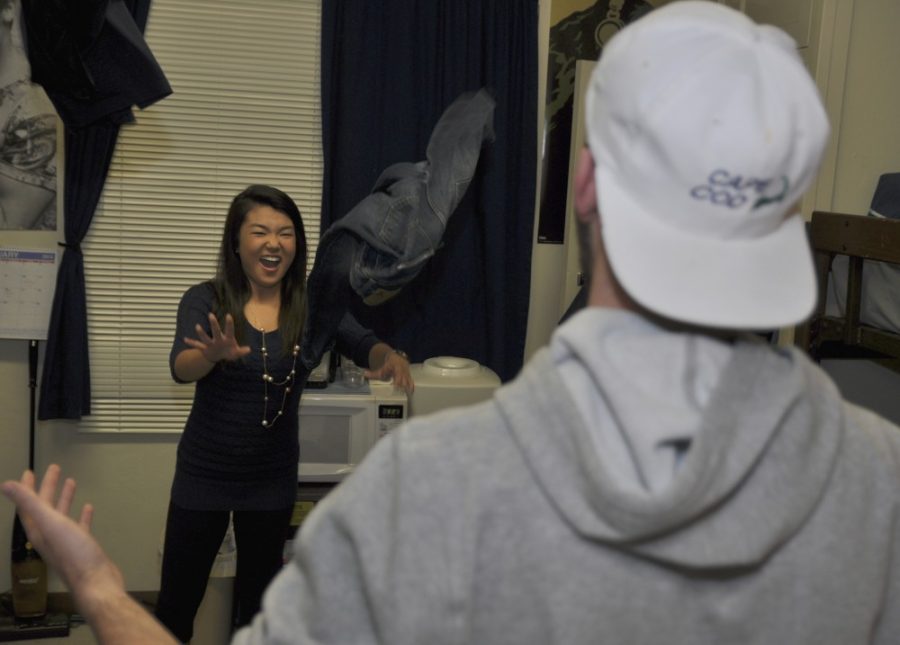One or two sleepovers a week turns into 10 days. Soon you’re splitting a closet and a bathroom schedule. It’s romantic and convenient, until it’s not.
Shacking up in college cuts costs and gets around hectic course loads that can make squeezing in time together hard, but for some more money means more problems.
Media arts student Brian Borowiec said moving in with his then girlfriend of two and a half years felt right. “It’s like living with your best friend.”
His relationship started off casually but developed into something much more. “I loved her so much that we needed to live together,” Borowiec said.
More and more college-age student couples are moving in together, according to Melissa Curran, assistant professor of family studies and human development. Whether it’s out of love, economics or convenience, moving in helps test the water before getting married.
Despite the trend, however, few people talk about the realities of shacking up, Curran said.
An article on the subject, “Sliding Versus Deciding: Intertia and the Premarital Cohabitation Effect,” describes how lines have become blurred between different types and stages of relationships and how many couples don’t share the same understanding of the path they are on together.
“The very ambiguity of cohabitation may undermine the ability of some couples to develop a clear and mutual understanding about the nature of their relationships,” the article states.
It’s easy to slide into living together, but the tricky part is that couples moving in together might not be doing it for the same reasons, Curran said. One person is of the mindset that it’s for love, that it’s a step in the direction toward marriage, and the other is thinking that it’s economical, convenient and an easy way to keep sexually active.
Borowiec said soon after he and his girlfriend started living together, the reality of living together drove them apart. But when the couple split, they had an unspoken mutual agreement that they would officially be done once the lease ended.
“It was the best way to do it,” he said.
Borowiec said if he had tried to get out of his lease when they realized they weren’t going to last, it would have cost rent and the deposit, around $500 a month for the rest of the lease.
Curran said problem arises for many couples who don’t discuss the full reality of moving in together. “You’re stuck,” she said, “and that’s the problem.”
Marriage is a much more formal commitment, Curran said. It’s agreed upon by each party and it becomes a joint decision with the future in mind. Moving in is an altogether different formal agreement allowing for a shorter time frame than something like marriage.
Testing the waters allows some to put off that larger commitment. Research shows that women and men are getting married later in life than in past years. According to the U.S. Census Bureau in 2009, the median age at first marriage rose to 27.4 for men and 25.6 for women in 2008. Curran said that men are often less committed in marriage if they have lived together beforehand.
Aside from “finding a partner that is on the same page as you,” Curran suggests students be realistic about moving in together, as many apartments, landlords and managers won’t let you back out of a lease once you’ve signed a contract.
Chelsea Carey, a sophomore studying physiology and Spanish, has been with her boyfriend for more than a year. She said she spends the night over at his house three or four times a week, especially because it is a lot closer to campus than her house. But when asked if she would consider moving in with him, she said no.
“You go through so many changes or self-discoveries between the ages of 18 and 25 and although ideally you’d want your partner to change with you, sometimes breakups or growing apart is inevitable,” Carey said. “You wouldn’t want to put yourself in a stressful situation, especially in a time of your life that can be stressful enough.”
Carey said she thinks people are better off waiting until they are at a steady place in life, whether it is in a career or graduate school before they try adding another person into the mix.
If he could do it over again, Borowiec said he definitely would. But he warns that couples “need to understand exactly what they’re in for. You have to be realistic about where the relationship is going and not believe that it will last forever.”









